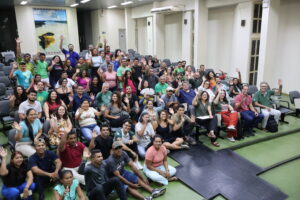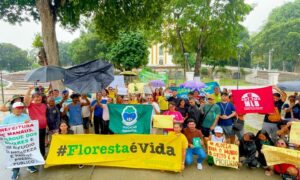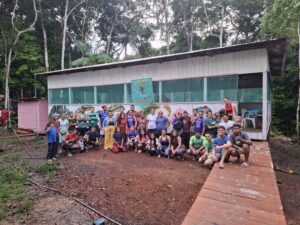Indigenous Peoples Week seeks to unify the struggle of indigenous peoples from different regions of the country and is part of the national celebrations of indigenous April, next to the Terra Livre Camp in Brasília.
By Fábio Pereira and Francisca Cardoso
With the sound of the maracá, the stamping of feet on sacred ground, sounds of chants and prayers, people celebrating, occupying their territories and painting squares and avenues, their villages, and urban centers with urucum as well as genipap. They celebrate what was instituted for them, the feast day, the day of the Brazilian Indigenous Peoples. For indigenous people, the month of April has become a month of struggle, resistance, but also of festivity and a moment that makes their demands more visible.
The indigenous April has been celebrated in many ways, without losing the real objective that is to remember the struggles and project new horizons for a segment that has been an example of resistance and organization: the indigenous peoples of Brazil.
Conselho Indigenista Missionário (CIMI) since the 1980s, every April, the Week of Indigenous Peoples has been held. Despite the name, the event takes place throughout the month, and is a space that strengthens collective struggles and dialogue with the National Indigenous movement to unify the struggles to guarantee the rights and defend the lives of indigenous peoples together. These rights are suffering numerous attacks and being constantly violated by public institutions in different spheres of government.
The theme of the week of Indigenous Peoples 2022 seeks to link to the theme of the Fraternity Campaign, carried out by Conferência Nacional dos Bispos do Brasil (CNBB). This year, the Campaign has as its theme: “Fraternity and Education” and the motto “Speak with wisdom, teach with love”, and the Indigenous Peoples Week has as its theme: Indigenous Peoples and education, and motto: “Education is a right , but it has to be our way.”

The motto of the 2022 Indigenous Peoples Week rescues the memory of indigenous teacher movements that, since the 1970s, have struggled to ensure public education policies that respect the wisdom, beliefs and forms of organization of each people. Indigenous people seek to conduct, in the daily life of their communities, differentiated educational processes, consistent with their unique ways of being, thinking and living.
The Indigenous Peoples week also allows indigenous peoples to debate, disseminate, expand, reflect, and take part in various manifestations, be they cultural presentations, public acts, national and local mobilizations, conversation circles, and much more.
The event brings together indigenous peoples, allies and supporters who collectively mobilize, unify their struggles and their agendas, around the struggles to stop the withdrawal of rights and strengthen policies aimed at indigenous populations and the protection of territories. In addition to giving visibility at the national, state and municipal levels to the demands of peoples regarding the land demarcation processes, demanding measures to be taken against violence and violations of rights, taking a stand against the bills that harm the lives of indigenous peoples and for the end of the genocide of indigenous peoples in Brazil.
Around the people’s week, Acampamento Terra Livre is one of the most visible events, bringing together indigenous peoples from all over the country in the federal capital. This year, the camp completed its 18th edition, which took place between the 4th and 14th of April, with the theme “Retaking Brazil: Demarcating Territories and Village Politics”. The event is organized by the indigenous movement, represented by organizations such Articulação dos Povos Indígenas do Brasil (APIB), and calls on the indigenous movement from different regions of Brazil and allies of the indigenous cause to mobilize around collective agendas.
Among so many agendas, Acampamento Terra Livre mobilized mainly “against projects that violate the rights of indigenous peoples, such as Bill 191/2020, which opens indigenous lands for large-scale exploitation, such as mining, hydroelectric plants and other plans for infrastructure; the Time Frame; PL 490/2007, which insists on the end of demarcations and the review of indigenous lands; PL 6,299/2002 – Pesticides, PL 2,633/2020; PL 510/2021 – Land grabbing; and PL 3,729/2004 – Environmental Licensing”.
Celebrating Indigenous April is for Indigenous Peoples! Whether those who are in the village or in the urban context, whether dancing and singing in their traditional land, or in the tapiri surrounded by large buildings. One of the most important moments is getting in tune with other relatives of the villages in Brazil, expressing a more different way of being and living.
Long live the struggle of indigenous peoples! Brazil is indigenous land!

Fábio Pereira and Francisca Cardoso are missionaries from the Indigenous Missionary Council (CIMI), North Region 1. CIMI is an organization linked to the National Conference of Brazilian Bishops which, in its missionary activity, has given a new meaning to the work of the Catholic Church with indigenous peoples.
CIMI works with more than 180 indigenous peoples in 26 states and in the five regions of Brazil. In the Middle Juruá they work with the Deni, Kanamari and Madija Kulina people.






